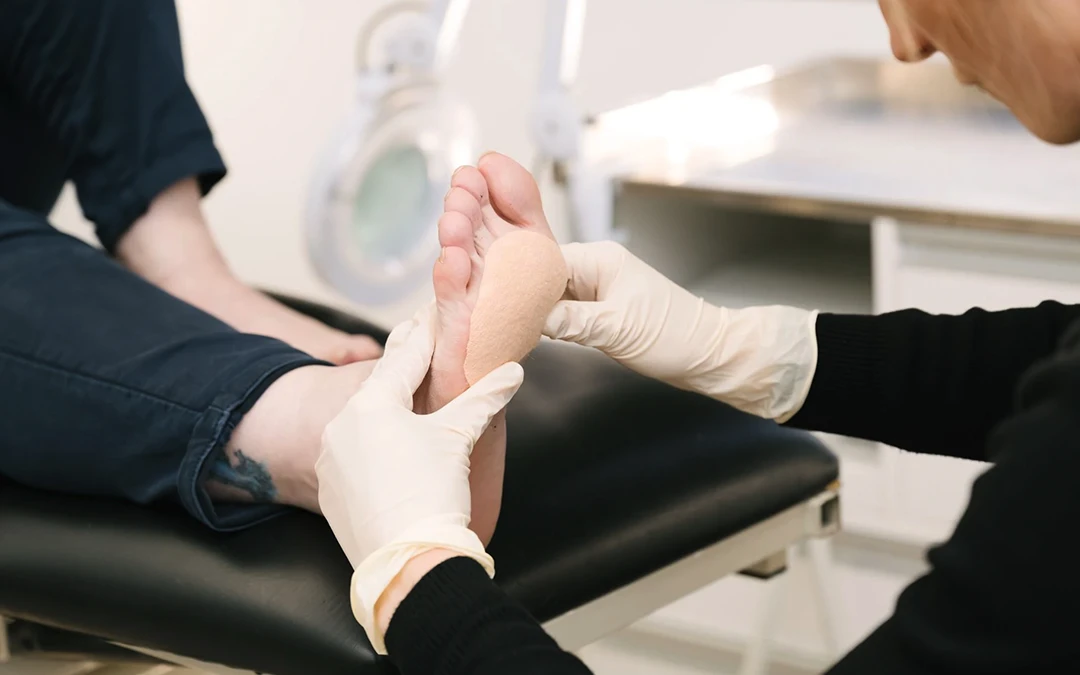How can podiatry help fix your skin and nail problems?
Tackling the skin and nail issues we’ve discussed can be difficult, and while they are sometimes minor enough to ease on their own, they often require a bit of clinical treatment to get the healing process started!
Here are just some of the quick and effective ways we can treat these problems in the Holistic Foot Clinic:
SKIN TREATMENTS
Callus
The quickest relief for this collection of hard skin is to remove the unwanted layers with different tools (ranging from scalpels to gentle sanding machines), sometimes followed by placing moisturisers and/or skin protective pads to help soothe these pressure areas.
Corns
These tricky little ‘stones’ of hard skin can dig deep into the foot, so careful removal of the hard body by scalpel is the prime method of eliminating this pain. This is often followed up with either a thin or thick padding to take pressure off the sensitive corn area.
Warts
There are a few ways of ‘hitting’ a wart on the foot. Our methods start with removing as much of the wart as possible, followed by either icing and/or applying medical grade anti-wart chemicals to the wart. Warts can be stubborn so this process can be quickly fixed, but sometimes takes multiple treatments.
Cracked Heels and Dry Skin
Similar to calluses, the cracked and hard skin need to be removed and the hard edges redefined into smooth surfaces – helping eliminate the dry, painful skin that hurts when standing. This can be finished with moisturisers or even protective bandages where needed.
Tinea / Fungal skin infection
Before anti-fungal treatments are applied, it is important to: a) removed old or hard skin which will get in the way, and b) open up the skin to soak up any creams or sprays to be applied. This is generally done via podiatry sanding machines.
Ulcers
If a wound is found, the first step is to remove any old, loose, decaying or infected skin/flesh as this generally prevents healing. Appropriate dressings/bandages and antiseptics are then applied to protect the area and boost the healing process.
NAIL TREATMENTS
Thick/long nails
Some nails are just too thick for home clippers! Podiatry clippers are used to cut back even the hardest of nails, and a medical micro-filing machine is generally used to file away the extra thickness of any tough nails. Non-staining antiseptic is always applied before & after to
ensure the nails stay healthy and clean.
Ingrown nails
An ingrown nail means you have a sharp spike sticking into your toe! So, just like you would with a splinter, the spike is removed – generally with the use of slender podiatry clippers and other tools to help separate the spike from the healthy nail and then slide it out. Preventing infection after this is vital so antiseptics & home care methods are always advised.
Oddly Shaped or Coloured nails / Fungal nails
Depending on the exact shape or colour concern, different things can be done in the clinic. However, in general the ‘odd’ parts of any nail will be cut or filed down to make it as normal aspossible. In the case of fungal infection or any other problems which will require the use of ointments or lacquers: it is important to file down and clean the surface of the nail to allow treatments of soak in properly.

